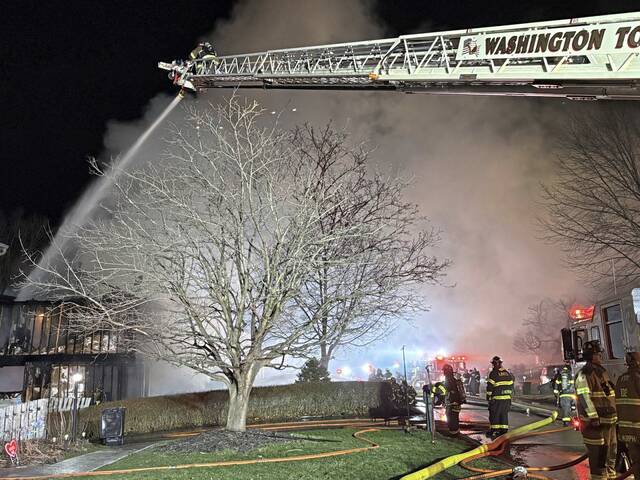Some of Allegheny County’s top staffers have received large pay raises over the past few years, and elected officials and a good government group are questioning the timing and amount of the raises.
Allegheny County salary documents published online show County Manager William McKain and Jennifer Liptak, the chief of staff for Allegheny County Executive Rich Fitzgerald, each received more than $50,000 in salary increases since 2019.
McKain now makes more than $235,000, and his salary jumped more than $75,000 since 2019, the records show. Liptak’s 2022 salary is $182,000, up more than $56,000 since 2019.
Other large raises went to Senior Deputy County Manager Stephen Pilarski and Mary Soroka, the county’s director of budget and finance. Pilarski got a salary jump of $44,000 between 2019 and 2022 to raise his salary to $160,000, while Soroka’s annual pay has increased nearly $25,000 over that same time span to raise her pay to $143,750, the records show.
Overall, these staff increases represent a small portion of the county’s overall budget. About $360 million of Allegheny County’s 2022 budget is set aside for salaries, accounting for about 42% of the county’s total spending.
Allegheny County Council President Pat Catena, D-Carnegie, said the timing of the raises for top staffers is concerning. Fitzgerald is term-limited and will be leaving office at the end of 2023. Catena said the late-term raises also mean county staffers’ pensions will be higher after the end of 2023.
“When you see someone’s salary go up 47% over a few years’ period, that doesn’t make sense to me,” Catena said. “To justify that when people are struggling to pay the bills, these are Allegheny County taxpayers who shoulder that.”
Staff salaries are listed on the Western Pennsylvania Regional Data Center website and linked on the county’s website after the fact, but the line-by-line salary information is not provided in the budget that county council votes on. The salaries were first reported locally by the Pittsburgh Independent.
“I voted for this budget, yet I had no idea that these raises were included,” Catena said. “I would not have voted for the budget had I known someone was going to get a (large) increase.”
Catena has introduced a bill he hopes will add more transparency to executive salaries in the budget-approval process. He said council members should be privy to this information before voting on budgets.
Allegheny County spokeswoman Amie Downs said the salaries of top staffers such as the county manager and chief of staff are at the discretion of Fitzgerald. She said Fitzgerald, who has served as the county’s top elected official since 2012, hasn’t always paid attention to salaries closely enough, and he noticed in the past few years that he hadn’t given those top staffers adequate raises.
In Fitzgerald’s second term, between 2016 and 2019, the average salaries of all county employees increased by about 6%. McKain’s and Liptak’s salaries each increased about 9% over this span, records show.
Between 2019 and 2022, McKain’s salary increased 46%, Liptak’s salary jumped 44% and Pilarski’s pay went up by 38% in the past three years, according to the records.
All county employees, on average, have received salary increases over these same years, but top county staffers’ raises easily have outpaced them. The salary data on the Western Pennsylvania Regional Data Center website show average salaries for county employees increased about 17% between 2019 and 2022.
Patrick Christmas, policy director at Philadelphia-based good government group Committee of Seventy, said the size of the raises stands out, especially when compared with the compensation of other government workers and most in the private sector.
He said raises are important for government staffers, but they should be given on a steady basis. Christmas said salary information also should be available for public scrutiny at all times, and the county executive should be responsible and accountable for raises.
“It’s important that salary levels in government be competitive to draw and retain talent, but such adjustments should happen steadily and deliberately, not accelerated into the end of someone’s tenure in a given position,” he said.
Downs said retaining top staffers can be difficult because of competition with the more lucrative private sector. She said it’s also important to keep salaries high enough compared with similar municipalities as a way to keep from losing staff to those communities.
“In the public sector, we are always competing with private companies as well as public sector organizations for top talent,” Downs said. “That certainly applies to top staff, and keeping their salaries in line with peer counties and other similar positions in our region is important for retention.”
The public-sector salary database Open Payrolls shows pay for top staffers in Allegheny County is in line with similar counties such as Cuyahoga County in Ohio, home to Cleveland; and Erie County in New York, home to Buffalo.
Cuyahoga County’s chief of staff was paid $229,507 in 2020, while Erie County’s deputy county executive was paid $164,326.
Downs rejected any notion that top staff salaries be compared to all county staff, noting many of them are unionized. She said top executives work significant hours, including on holidays, vacations, weekends and days off without overtime, and equating them to unionized employees is “like comparing apples to oranges.”
She added that top county staffers also took on additional hours and responsibility because of the county’s response to the covid pandemic. Allegheny County has one of the highest vaccination rates in the state, particularly among seniors.
“There is a small, core group of officials – including the chief of staff and county manager – who came to work every day during the pandemic and worked to stay on top of the needs of the county and ensured that we were able to continue providing the services that residents relied upon and needed,” Downs said.
Allegheny County Councilwoman Bethany Hallam, D-North Side, is a co-sponsor of Catena’s budget transparency bill. She said that many lower-level county employees asked for 3% raises recently, instead of their 2.5% cost of living adjustment, but were denied. Hallam said that strikes a contrast to the top staffers who received 30% or 40% salary increases.
“If the administration wants to argue that working during covid presented unique challenges, which no one disputes, then why didn’t all workers see the same appreciation and raises as the county executive’s inner circle?” Hallam said.
Catena said he understands top staffers should be compensated at levels similar to peer counties but said county council should be at least part of those discussions.
“If someone would have come to me and said we need to get these people up to speed, I might not have been in favor of it, but at least the discussion would have been had,” Catena said.








